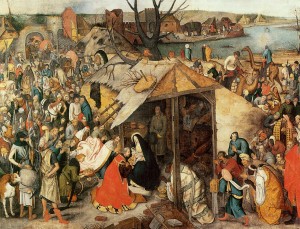[The Adoration of the Magi, Brueghel, Pieter (the Younger)]
The following talk is from a service that took place at Victoria College in December 1973:
On Christmas
Northrop Frye
There is no indication in the New Testament of the time of year when Jesus was born, and the infancy narratives in Matthew and Luke are relatively late. The earlier Gospels, Mark and John, begin with the Baptism, which became the main festival, outside Easter, in the eastern churches. The western churches seem to have introduced Christmas because of a feeling that the natural birth of Christ should be emphasized, to counteract a feeling that Jesus was not a man who was born and died, but a kind of ghost who manifested himself for a time and then disappeared. We don’t know why the Church decided on December 25, but it looks as though Christianity, for once, was adopting something outside the Biblical tradition. Almost every people in the ancient world had some kind of festival at the winter solstice, the time of year when the nights are longest, when some kind of primitive fear emerges that the sun might go out altogether if not encouraged by a ritual of lights and fires. In the great rival religion of Mithraism, which stretched from Persia to Scotland, the chief festival was the birthday of the “unconquered sun” on December 22, and Northern Europe had its “Yule,” when a great log was ceremonially set burning.
In the Church calendar Christmas is preceded by four weeks of Advent, a sombre, brooding season of the gathering powers of darkness. The infancy stories grow, in part, out of the Exodus story of the Passover, when the Angel of Death was let loose in Egypt and the Israelites held their first Passover standing up and in haste, ready for a quick and silent departure. This feeling recurs in the infancy stories with the account of the slaughter of the innocents, the flight of the Holy Family to Egypt, and the stealthy departure of the wise men. The book in the Apocrypha called the Book of Wisdom describes the time of the first Passover thus:
[For while all things were in quiet silence, and that night was in the midst of her swift course,
Thine Almighty word leaped down from heaven out of thy royal thone, as a fierce man of war into the midst of a land of destruction,
And brought thine unfeigned commandment as a sharp sword, and standing up filled all things with death; and it touched the heaven, but it stood upon the earth.(Wisdom of Solomon 18:14–16)]
This is the starting point of the tradition that Christ was born at midnight, just as he was crucified at noon. Besides the two infancy stories, there is a third account of the birth of the Messiah in the New Testament, in Revelation 12, a much more obviously mythical account, and this too preserves the sense of blood and terror and menace in the Christmas story:
And there appeared a great wonder in heaven; a woman clothed with the sun, and the moon under her feet, and upon her head a crown of twelve stars:
And she being with child cried, travailing in birth, and pained to be delivered.
And there appeared another wonder in heaven; and behold a great red dragon, having seven heads and ten horns, and seven crowns upon his heads.
And his tail drew the third part of the stars of heaven, and did cast them to the earth: and the dragon stood before the woman which was ready to be delivered, for to devour her child as soon as it was born.And she brought forth a manchild, who was to rule all nations with a rod of iron: and her child was caught up unto God, and to his throne.
And the woman fled into the wilderness, where she hath a placed prepared of God, that they should feed her there a thousand two hundred and threescore days.(Revelation 12:1–6)
W.H. Auden’s radio drama, For the Time Being, also called a Christmas Oratorio, begins with a section called Advent, where the growing power of darkness is linked to the exhaustion of the Roman Empire and the fact that even at the height of its power the barbarians who will eventually destroy it are gathering on the frontiers. The parallels between the time of Christ’s birth and our own time emerge very clearly:
Darkness and snow descend;
The clock on the mantlepiece
Has nothing to recommend,
Nor does the face in the glass
Appear nobler than our own
As darkness and snow descend
On all personality.
Huge crowds mumble—‘Alas,
Our angers do not increase,
Love is not what she used to be’;
Portly Caesar yawns—‘I know’;
He falls asleep on his throne,
They shuffle off through the snow:
Darkness and snow descend. (pt. 1, ll. 1–14)
